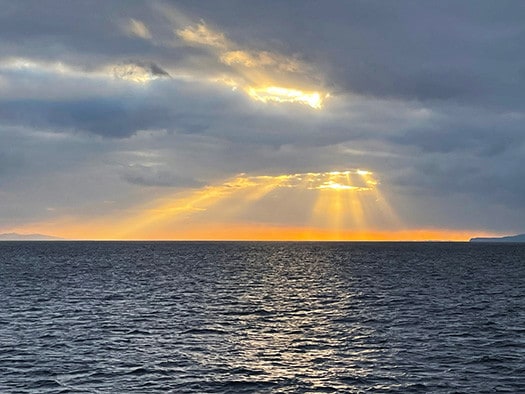

わたしは仕事人生で新規開拓型の「営業」を主たる行動スタイルにしてきました。
いまは、そういう仕事的スタンスから少し自由度が加わってきたのですが、しかし同様に「取材」というスタイルで各地で「ひとを訪ねる」ことも必要性が高まってきている。
旅をするというのはたぶん人間の本然のいちばん底辺にその動機部分が潜在しているように思う。考えて見れば当たり前で、人類は「グレートジャーナー」という地球上の全大陸に進出した唯一の動物種。それがどういった「動機」に由来しているのかはまだ、解明されていないけれど、人類、そしてそれ以前からの進化の過程そのものにDNA組み込みされているに違いない。まったく抵抗不能な能動性を人間は間違いなく持っているのだろう。
写真は最近あちこち行脚している途中でついシャッターを切っていた光景。
地球環境というのは、実にさまざまな表情で人間の感受性を刺激してくる。空の雲は常に千変万化して、太陽や星たちの運行に沿って多彩な画像を人間の感受性に「ふりそそいで」くる。こういう「目に見える地球」の映像は、はるかな広がりを焼き付けてくる。
あの空の先にはどんな光景が広がっているのか、見てみたい,感じてみたい。
たぶん始原的な感性の部分で、それを「神の手」と言っても問題ない部分で、人間は強く影響を受けて導かれているのだろう。

日本史で言うと、西行という人物に惹かれています。1118年生まれ1190年死亡。平均的にはより短命だった時代に70才を超えていた。現在のわたしの年齢ほどでなくなっている。若くして王城を守護する北面の武士になり、鳥羽院にその歌人としての才を認められたのだという。同時期の北面の武士に平清盛がいる。
「後鳥羽院御口伝」に「西行はおもしろくてしかも心ことに深く、ありがたく出できがたきかたもともにあひかねて見ゆ。生得の歌人と覚ゆ。おぼろげの人、まねびなどすべき歌にあらず。不可説の上手なり」とあるごとく、藤原俊成とともに新古今の新風形成に大きな影響を与えた歌人とされている。日本の皇統は文化面での主導者であり、そういう才を愛でられて生涯を過ごした人物なのだと思われる。
そういう才を活かすためにか、求められてか、たぶんその両方なのだろうけれど生涯を旅に過ごしている。実際にこの時代に四国讃岐とか、奥州藤原氏の平泉とか、鎌倉・源頼朝など全国各地を「歩いて」訪ね歩いている。歌人という文化サロンの人物であり、一種の「外交調整者」としてメッセンジャー機能を期待もされていたのだろう。
現代人は西行の時代の比ではないほどに遠行が可能であり、また旅の手段も進化している。そして社会の複雑化もはるかに進行し、文化も多様化してきている。
しかし人間の生きる「彩り」としての部分では共通するものはあるだろう。別に歌を書きたいワケではありませんが、はるかなる生き方を示してくれている先人という思いを持っています。
English version⬇
The sky, the horizon, and the horizon.
My mind is gradually moving toward simplicity (laughs). When Kukai attained liberation, there was only "the sky and the sea. Is this a Japanese mentality that is also connected to the poet Saigyo? I am not sure.
In my professional life, my main activity style has been "sales" in the form of new business development.
Now I have a little more freedom from such a work stance, but there is a growing need for me to "visit people" in various places in the form of "interviews" as well.
I think that the motivation to travel is probably latent at the very bottom of human nature. It is only natural to think about it. Humans are the only "great travelers," the only animal species to have made it to every continent on the planet. What kind of "motive" this is derived from has yet to be elucidated, but it must be embedded in the DNA of the human species and in the evolutionary process itself from before. Humans definitely possess a completely irresistible active nature.
The photo is a scene I snapped a few times during my recent travels around the world.
The global environment stimulates human sensitivity in a variety of ways. The clouds in the sky are constantly changing and "sprinkling" various images onto our senses in accordance with the movements of the sun and stars. These images of the "visible earth" burn a far-reaching expanse into the mind.
We want to see and feel what kind of scene spreads out beyond that sky.
Perhaps it is the primitive sensitivity, which we can call "the hand of God," that is strongly influenced and guided by human beings.
In Japanese history, I am drawn to a man named Saigyo, born in 1118 and died in 1190. He was over 70 years old at a time when life on average was shorter. He is no longer as old as I am today. At a young age, he became a warrior of the northern front guarding the royal castle, and his talent as a poet was recognized by the Toba Inin. He was recognized as a talented poet by Toba-in at the same time.
In the "Go-Toba-in Gokuden," it is written, "Saigyo is interesting and has a deep heart. He is a poet by nature. He is not a poet to be imitated by those who are ignorant. He is a poet who, along with Fujiwara no Toshinari, had a great influence on the formation of the new style of the new Kon-Ten style. The Japanese imperial lineage was led by him in terms of culture, and it is thought that he was a man who spent his life being loved for such talents.
He spent his life traveling, perhaps to make use of his talents, perhaps in response to demand, perhaps both. In fact, during this period, he "walked" around the country visiting places such as Sanuki in Shikoku, Hiraizumi under the Oshu Fujiwara clan, and Minamoto no Yoritomo in Kamakura. He was a poet, a cultural salon figure, and was probably expected to function as a kind of "diplomatic coordinator" and messenger.
Today, people can travel much further than in Saigyo's time, and the means of travel have also evolved. Society has become far more complex, and cultures have become more diverse.
However, there are some things in common in terms of the "color" of human life. I do not wish to write a song, but I have the feeling that our ancestors are showing us a far more advanced way of life.










